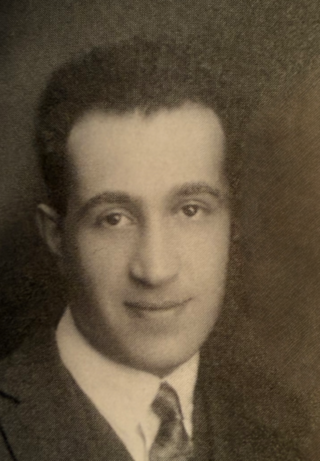DDr. Mark (Markus) Siegelberg

Personalia
Born:
Died:
Profession:
KZ Number:
Curriculum Vitae
Markus, called 'Mark', Siegelberg was born in Luzk [today in Ukraine] as the legitimate son of the merchant Bernhard and Maria Siegelberg. The Jewish family soon moved to Vienna, where he attended grammar school. After graduating from high school, he enrolled in law at the University of Vienna in 1918, where he was awarded a doctorate in law in 1922. He also studied economics at the University of Bern and was awarded a doctorate in economics.
From 1922, Mark Siegelberg worked as a journalist for the newspapers Der Morgen, Die Stunde and Der Tag and was editor of the newspaper Die Stunde from 1934 to 1938. In 1924, he married Amalie Sophie Juran, with whom he subsequently had a son and a daughter. In mid-1937, the family moved into a new apartment at Dr. Karl Lueger Platz 2 in Vienna's 1st district and furnished it for the sum of 20,000 schillings. [Note: 20,000 schillings was a very large sum of money in 1937.]
On March 12, 1938, Mark Siegelberg witnessed the demise of a free and independent Austria with the invasion of the German Wehrmacht. With the occupation of Austria, German legislation was adopted and with it the 'Nuremberg Racial Laws', according to which Mark Siegelberg was considered a 'full Jew'.
On 13 March 1938, Mark Siegelberg was arrested. Mark Siegelberg was arrested by the Gestapo on March 13, 1938 and deported to the Dachau concentration camp on April 2, 1938 on the so-called 'Prominent Transport'. From there, he was transferred to Buchenwald concentration camp on September 23, 1938.
A few days after the occupation of Austria, the entire house at Dr. Karl Lueger Platz 2 was requisitioned as new quarters for the National Socialist Gauleiter Odilo Globocnik, which meant that the apartment had to be vacated immediately, leaving behind all of its furnishings.
My dearest, my only Lia!
Your letter of 8/4 made me extremely happy. I see from it that all the preparations for our departure have already been made. The care of our friends in Shanghai, who have even sent me an employment contract, is also particularly gratifying.
I am also pleased to hear that it seems that our boy will soon be accommodated in hospital.
Dearest, let us hope that our reunion is near now that all the departure papers are ready. I can hardly tell you how much I long for it. But, my dearest, with all your worries about me, think of yourself too. You know what you mean to me. Stay truly healthy for me too. I warmly kiss my parents, Hans and his family and greet all the good friends who are so lovingly at your side.
So long for a speedy reunion! For the time being, I kiss you many, many times in my thoughts and remain your loving Mark
On May 22, 1939, Mark Siegelberg was finally released from Buchenwald concentration camp and emigrated to Shanghai with his family on June 1, 1939. There he worked on the exile magazines The Shanghai Herald and the Shanghai Jewish Chronicle.
With Hans Schubert, he wrote the plays Die Masken fallen and Fremde Erde. After the premiere, the German ambassador intervenes with the Japanese administration.
In December 1941, he is evacuated to Australia by the British because of his work for the British Information Service. As he was unworthy of an academic degree from a German university as a Jew, his academic degrees were revoked in July 1942.
In Australia, he witnessed the liberation of Austria and the re-establishment of the Republic in April and May 1945. However, he decided to remain in Australia with his family and became an Australian citizen. Between 1950 and 1954, he worked as a furniture salesman in Melbourne. In 1954, he founded the immigrant magazine 'Neue Welt' (later renamed 'Neue Heimat und Welt'). On May 15, 1955, his revoked academic degrees were restored.
Places
Residence:
Persecution:
Citations
Wiener Stadt- und Landesarchiv (WStLA)
Dokumentationsarchiv des österreichischen Widerstands (DÖW)
Wikipedia unter de.wikipedia.org/wiki/Mark_Siegelberg
Archiv Universität Wien
